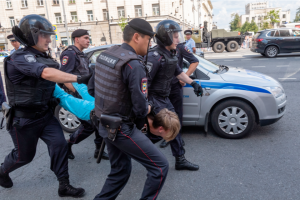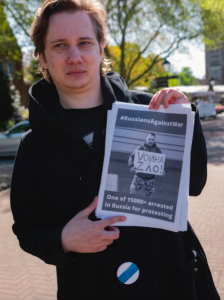Countries are people. In democracies, these people determine the politics of the countries. In autocracy they don’t, they exclusively work for the economy of their country. Vladimir Putin doesn’t care about people. He doesn’t care about Russians and Ukrainians, or any other people. He doesn’t care about the global food crisis that happens because the Russian Navy continues blocking the Ukrainian ports.

Just to give you an example. Russia has a big domestic IT market where many successful companies have grown up in a competitive environment. Such Russian-based companies as Yandex, mail.ru, and VK are more popular in Russia than their Western counterparts such as Google and Facebook. These companies are often commercially successful, though some have changed their owners along the way. At the moment, many of them are forced to help Putin in his war, although many of their employees oppose it as they are against Putin’s regime and the war in Ukraine. You might ask: how do we know that? The answer is emigration.
The previous wave of Russian emigration was mainly driven by talented people’s ambitions to pursue their careers. Physicist Andre Geim is a bright example. He was born in Sochi in the Soviet Union, graduated from the Moscow Institute of Physics and Technology, and emigrated from Russia to continue his scientific career in Great Britain and The Netherlands. In 2010, he was awarded the Nobel prize in Physics. Many more Russians are contributing to the economic growth of Europe, Israel, and the USA. And now we see thousands of highly skilled professionals fleeing Russia for fear of their basic rights and freedoms being curtailed. If they stay in Russia, they would waste their qualifications. Or, even worse, their talent would serve the Russian war machine.
Political migrants are not necessarily asylum seekers, many are educated enough to find high-skill jobs. However, they face numerous difficulties in the near future, such as proving their education level, which is becoming especially complicated, especially when the Russian government aims to withdraw Russian educational institutions from the Bologna system.
At the moment, the Russian diaspora is undergoing a significant transformation, being connected to those in Russia and people in exile in different countries. The Russian diaspora has never been so unified in their opposition to the Kremlin regime and this unified character only gets stronger. This new diaspora consists of professionals from various sectors, like journalism, tech, culture, and business. These groups appear in many countries of the world because many fled the country for political reasons after the 24th of February. These political emigrants, in most cases, are aiming to return to Russia when this will be possible, that is why they are maintaining close ties with both their country of origin and residence.

According to Russian law, all men from 18 to 27 years of age are eligible for military conscription, while those staying in the army reserve can be mobilised up until 50 and in some cases 60 years of age. During the war, the conscripts can be sent into action in Ukraine and become involuntary combatants, and murderers. We believe that there should be a way to provide asylum or temporary protection for the conscripts who do not want to become an instrument of the war. It should be possible to seek asylum for those under the threat of mobilisation or conscription.
One of the important things to mention about the Russian army is that the regime uses it as a repression instrument. Nobody helps conscripts because it is not enough to claim asylum. The Russian authorities can do this bypassing the judgments due to how the system works in that flow. Lawyers cost a lot for these cases and you should pay for them with your own money.
The most famous case is that of Ruslan Shaveddinov. He was a young prominent activist whose name was often featured in high-profile public campaigns organised by Alexey Navalny’s team he was a member of. In 2019, Ruslan was kidnapped and moved to “Novaya Zemlya”, the former nuclear test site in the Arctic, to serve in the army for a year. The picture below shows how far it is from Moscow.
Thanks to the independent Russian press, we know that the army regulations are still used by Russian authorities to this day as an instrument of repression. For instance, Ivan Fedotov, a Russian hockey player, was recently sent to the army in a similar way. He played in the Central Sports Club of the Army. He was supposed to start playing in the NHL next season. On the 1st of July, Ivan Fedotov was kidnapped. This looks like the revenge of the club and is completely different from the conscript norms. Previously, the Russian Ministry of Defence admitted that army conscripts were sent to Ukraine to take part in the war. We are afraid that the Russian government will send repressed people to the war.
In the past two decades, Russians have massively protested many times against the regime, and every time the repression became harsher. The real change came after the Bolotnaya protests, unprecedented repressions were used by law enforcement and legislative authorities were used against the citizens. Despite this, mass protests happened in support of Alexei Navalny in 2021, anti-war protests in the days after 24 February were harshly precipitated. To be against Putin in Russia is one of the most dangerous things to be. We know about Navalny’s and Nemtsov’s cases, Skripal’s and Litvinenko’s cases. And this is only the tip of the iceberg, based on the statistics of ECHR. Currently, in Russia the word “war” is prohibited. Recently, the Moscow municipal deputy Gorinov did this and has been arrested. Gorinov is sentenced to 7 years in prison for his right to call this war a war. Also, on 13 July 2022 the famous politician Ilya Yashin was arrested and is at risk to be sentenced to prison because of his anti-war position. Vladimir Kara-Murza is another famous opponent to the regime who was set in jail recently. Russia is the most frequent defendant in human rights cases. One of the most popular violations of human rights is torture, which is, of course, also applied to political prisoners.
Who are these Russian political prisoners? They are journalists, employees of non-profit organisations and people taking part in protests, eco-activists, election observers or people who openly express their political views in posts on social networks or otherwise. They share democratic, European values such as freedom of expression, freedom of assembly and association, and freedom of thoughts and conscience. And just for that they are treated as traitors in Russia.
It is no wonder that Russian criminal law has numerous articles directed exactly against political activists. The severity ranges from fines to years and decades in prison. People persecuted by them should be entitled to asylum or temporary protection since the overwhelming majority of cases currently open are political. These activists struggle to build a democracy in their own country and those activists who managed to flee the country will definitely return to Russia when the regime of Putin falls. By helping such people, the EU will directly contribute to re-establishing democracy in Russia, building political bridges, and enforcing the political transition from Putin’s totalitarianism.
Freedom in Russia is one of the primary interests of Europe and the world. If Russia slips further into totalitarianism, the world will live at continuous risk of military aggression. But countries are people, and if these people know that the world will not blame them for their nationality, and will offer them help in their fight for freedom and democracy, they will continue to do their best to stop the war and make Putin face the consequences of his unlawful actions.
Please subscribe to the English language edition of the Russian independent journalist platform Meduza to follow news on war and politics in the region: https://meduza.io/en/pages/newsletter
About the author:
Roman Iutsis is one of the volunteers at FreeRussiaNL and the Kovcheg project. Born in Irkutsk. In 2014, Roman moved to St. Petersburg to study at the ITMO University. After acquiring his Master’s degree in Mechatronics, Robotics, and Automation Engineering he left Russia in 2021 to avoid being conscripted into the Russian Army. In the Netherlands, he works as an Automation engineer at a tech company in Amsterdam. In Russia, he participated in protests since 2015 and was arrested a couple of times without protocol.
About Free Russia NL:
Free Russia NL is a grassroots community of Russian-speaking residents and citizens of the Netherlands. Our community was founded in January 2021, during the protest wave in Russia and abroad against the arrest of Alexey Navalny. Until 24 February 2022, our telegram channel had around 300 members. For all of us, inside and outside Russia, life changed dramatically that day. Overnight, our membership rose to 1,200 members – a sign for us of a great need in the Russian-speaking community in the Netherlands to speak out against the war and against the regime, to show support for Ukraine and for each other. We also see great interest in our position from the Dutch society.
On 29 June, our organisation was registered as an official foundation in the Netherlands. Since the beginning of the full-scale invasion, we have been taking action: raising money for humanitarian aid to Ukraine and Ukrainian refugees in the Netherlands, helping journalists and activists from Russia who are forced to leave the country, and communicating with the Dutch media and government. The objectives of the FreeRussiaNL Foundation are to promote democracy, human rights, and the rule of law. More specifically we attach to democratic values, human rights, freedom of expression, freedom of assembly and association, freedom of thought and conscience, tolerance, and non-discrimination. We bring together and support the Russian-speaking community, based in the Netherlands, and keep close ties to similar organisations around the world.


